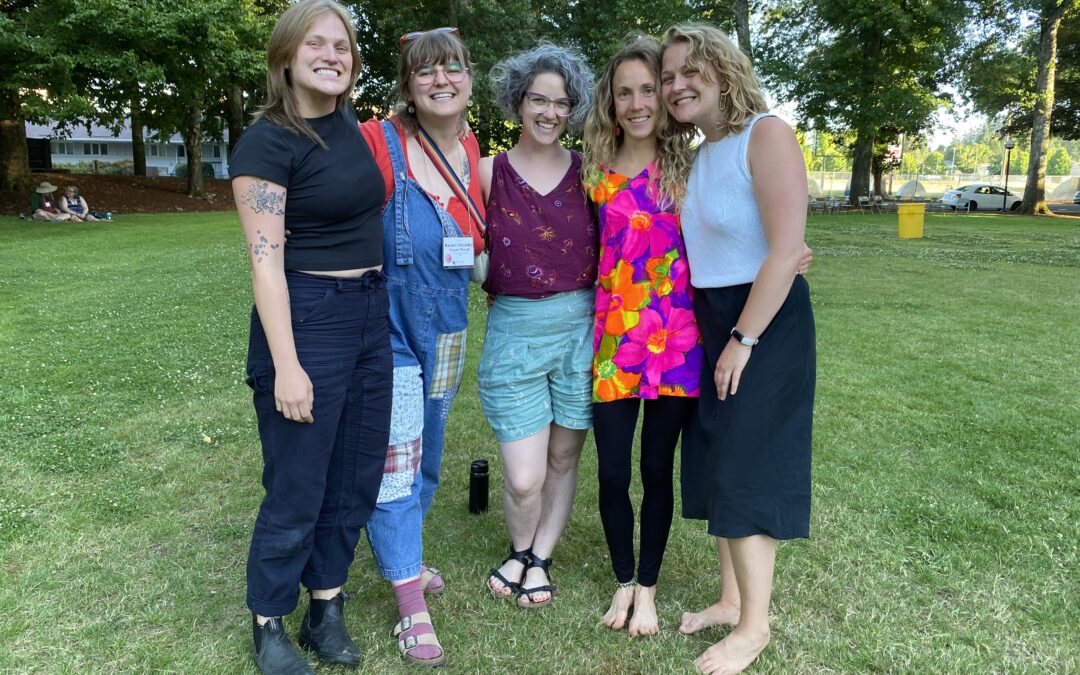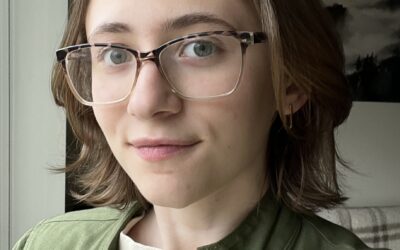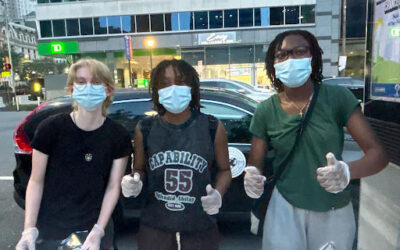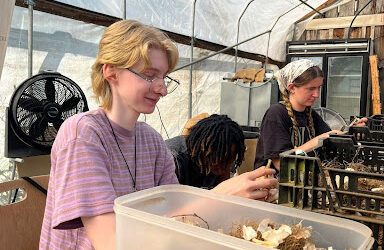Photo: Miche McCall, Rachel Logan-Wood, Hilary Burgin, Linnea Halsten, and Eva Whittaker at FGC The Gathering in July 2023.
Threshing and discerning…
This summer we’re threshing and discerning ideas for expanding our offerings. In November 2023 the board, with staff input and support, will discern which expansions to offer. We’ll recruit QVS applicants for these new ideas starting that same month, November 2023, and through the recruitment season – but we won’t see the results of this recruitment until the end of February 2024, when applications are due. We’ll start the 2024-2025 program in just over a year having had only one short recruitment season during which to spread the word about the shifts. In order to fully test the experiments and offerings, we’ll likely want to recruit at least one more year to make sure to reach the right groups of potential applicants. The program shifts currently on the table include (but are not limited to):
1. Increasing the Fellow stipend.
We hope to find a balance between living simply without causing financial hardship. The QVS stipend has changed from $100/month in 2012 to $250/month this upcoming year. However, a monthly stipend of $250 may not provide Fellows with the feeling of financial security; we need to consider if this is still too low.
2. Expanding site placement partners.
Until now we have only partnered with non-profits, but we are looking into partnering with businesses to offer opportunities that cover a broader range of interests. We believe that faithful, Spirit-led work can also be valuable in the business sector and that we are likely missing potential applicants.
3. Inviting Fellows to bring their own site placement.
The economy is seeing a very low unemployment rate, which means prospective Fellows have many more job opportunities than pre-pandemic. Allowing a Fellow to “bring their own” site placement would allow prospective Fellows to bring a job to the program but still engage in the rest of the QVS experience, including living in intentional Quaker living and exploring spiritual community.
4. Shifting program expectations
In recent years, we have received feedback from Fellows that the program is too demanding. What would it look like if the program was less challenging? Very few people (of any age!) are looking to have more challenges in their lives right now.
Some background on pandemic-related shifts in recruitment trends:
The recruitment season for our 2020-2021 Fellowship year took place December 2019 through March 2020. Even though the pandemic and the impacts on health and community in the USA started in March 2020, we had a typical number of applicants and Fellows. We began our 2020-2021 program year “normally (albeit in the midst of a pandemic).”
The recruitment season for the following year, 2021-2022, ran December 2020 through February 2021. It was a fully remote and online recruitment season, which was weird, but resulted in a “typical” applicant pool and number of Fellows.
We continued with our recruitment efforts for a cohort for our current Fellowship year, 2022-2023. Recruiting activities went from December 2021 through February 2022. But, wow, recruitment was hard. It was the second year of online-only recruitment. We used the same techniques and tactics as previous years, but received ⅓ as many applications as we had received previously. We discerned, in March 2022, that we needed to pause the Atlanta program in order to have larger houses in our four remaining cities. We believed that this was a blip due nearly entirely to the pandemic: the inability to meet potential applicants in-person, the concerns of young adults regarding living in a large house community, the desire to stay close to home, etc. We chose to have 18 Fellows for a year with the understanding that we’d keep infrastructure in our four remaining cities and be able to have robust programs again the following year, 2023-2024.
And, we also made changes. We didn’t simply do the same-old, same-old. Because of the “blip,” we chose to invest in a dedicated communications consultant and a full-time, year-round recruitment staff member. We hired a Recruitment and Marketing Coordinator in Fall 2022 to lead recruiting efforts November 2022 through February 2023 (and beyond) for the 2023-2024 program year.
We learned towards the end of this recruitment season that our low applicant numbers weren’t a one-year blip; large societal forces are also at play. We discerned to pause the Twin Cities program (which had only one confirmed Fellow for this upcoming year) and focus on recruiting for our three remaining houses. We currently have 11 Fellows confirmed for the program starting in August 2023.
We now see that we’re in a trend impacted by the cultural shifts that have coincided with the pandemic. Young adults are less interested in participating in a service year. Large programs such as Americorps and the Peace Corps see their recruitment numbers directly correlated with the economy; when people (and particularly young adults) feel they can find a job in their career path, they are less likely to participate in a service year. Anxiety young adults feel regarding their financial stability is palpable. We also hear that the parents of potential applicants are not supportive of their children participating in QVS; the uncertainty about the future weighs heavily on a lot of us.
So, we’re expanding the ways that QVS can reach potential applicants! This means, however, that we both need to make decisions soon AND it will be a while before we see the results of these decisions.
“My big takeaway is that community and spirituality are very connected. In the past I’ve struggled to know what my connection to spirituality is and, as a result of being in an intensive community environment, I’ve learned that community is a way to connect with the spiritual. I see service as a vessel for community and through community there is a connection to spirituality.”
-
2022-2023 Boston Alum
More Quaker Service Stories
Summer Lab Testimonials: Lillian Regal
Written by Lillian Regal Hi Friends! I chose to participate in the Summer Lab for two main reasons: first, I’m passionate about thefield of public health and wanted to better understand the role that nonprofits can play in thisfield. Second, I’ve pushed myself towards...
Summer Lab Testimonials: Uchechi Anaba
Written by Uchechi Anaba Dear friend, For five weeks, it was my great privilege to live in Philadelphia with six young adults from all across the country in what a housemate jokingly referred to as our Quaker commune. Through the highs and lows of taking such a chance...
Summer Lab Testimonials: Meaghan Robinett
Written by Meaghan Robinett I wanted to join the QVS Summer Lab because I had an intense need to help the community and people around me during this time of rising inequality, fascism, and uncertainty. I knew that joining the QVS Summer Lab would both allow me to...






the burden of student loans is a detriment to recruiting young people who recently graduated from college. Biden administration’s plans for loan forgiveness hit a wall and may not get back on track again any time soon. Maybe if part of QVS support for Fellows included payment of student loan for Fellow during their QVS year, you might get more takers. Does the Fellow receive a salary from the NGO where they are working?
the burden of student loans is a detriment to recruiting young people who recently graduated from college. Biden administration’s plans for loan forgiveness hit a wall and may not get back on track again any time soon. Maybe if part of QVS support for Fellows included payment of student loan for Fellow during their QVS year, you might get more takers.
Thank you Julia, we agree that the debt burden is negatively impacting young people’s ability to participate in QVS and other aspects of adult life. It’s truly a crisis and I hope we can find a way to help. -Caitlin